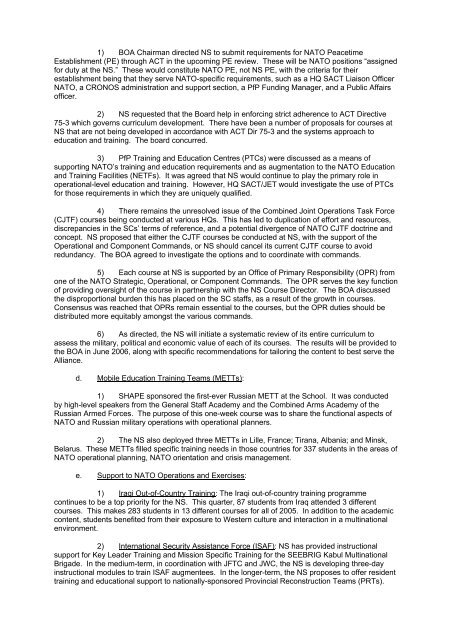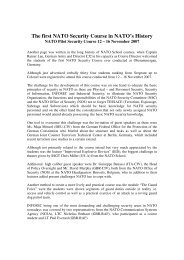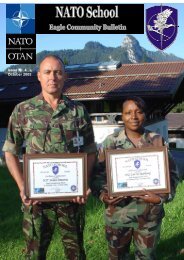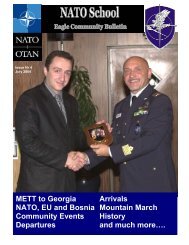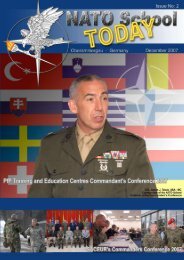Issue Nr. 1 March 2006 - NATO School
Issue Nr. 1 March 2006 - NATO School
Issue Nr. 1 March 2006 - NATO School
You also want an ePaper? Increase the reach of your titles
YUMPU automatically turns print PDFs into web optimized ePapers that Google loves.
1) BOA Chairman directed NS to submit requirements for <strong>NATO</strong> Peacetime<br />
Establishment (PE) through ACT in the upcoming PE review. These will be <strong>NATO</strong> positions “assigned<br />
for duty at the NS.” These would constitute <strong>NATO</strong> PE, not NS PE, with the criteria for their<br />
establishment being that they serve <strong>NATO</strong>-specific requirements, such as a HQ SACT Liaison Officer<br />
<strong>NATO</strong>, a CRONOS administration and support section, a PfP Funding Manager, and a Public Affairs<br />
officer.<br />
2) NS requested that the Board help in enforcing strict adherence to ACT Directive<br />
75-3 which governs curriculum development. There have been a number of proposals for courses at<br />
NS that are not being developed in accordance with ACT Dir 75-3 and the systems approach to<br />
education and training. The board concurred.<br />
3) PfP Training and Education Centres (PTCs) were discussed as a means of<br />
supporting <strong>NATO</strong>’s training and education requirements and as augmentation to the <strong>NATO</strong> Education<br />
and Training Facilities (NETFs). It was agreed that NS would continue to play the primary role in<br />
operational-level education and training. However, HQ SACT/JET would investigate the use of PTCs<br />
for those requirements in which they are uniquely qualified.<br />
4) There remains the unresolved issue of the Combined Joint Operations Task Force<br />
(CJTF) courses being conducted at various HQs. This has led to duplication of effort and resources,<br />
discrepancies in the SCs’ terms of reference, and a potential divergence of <strong>NATO</strong> CJTF doctrine and<br />
concept. NS proposed that either the CJTF courses be conducted at NS, with the support of the<br />
Operational and Component Commands, or NS should cancel its current CJTF course to avoid<br />
redundancy. The BOA agreed to investigate the options and to coordinate with commands.<br />
5) Each course at NS is supported by an Office of Primary Responsibility (OPR) from<br />
one of the <strong>NATO</strong> Strategic, Operational, or Component Commands. The OPR serves the key function<br />
of providing oversight of the course in partnership with the NS Course Director. The BOA discussed<br />
the disproportional burden this has placed on the SC staffs, as a result of the growth in courses.<br />
Consensus was reached that OPRs remain essential to the courses, but the OPR duties should be<br />
distributed more equitably amongst the various commands.<br />
6) As directed, the NS will initiate a systematic review of its entire curriculum to<br />
assess the military, political and economic value of each of its courses. The results will be provided to<br />
the BOA in June <strong>2006</strong>, along with specific recommendations for tailoring the content to best serve the<br />
Alliance.<br />
d. Mobile Education Training Teams (METTs):<br />
1) SHAPE sponsored the first-ever Russian METT at the <strong>School</strong>. It was conducted<br />
by high-level speakers from the General Staff Academy and the Combined Arms Academy of the<br />
Russian Armed Forces. The purpose of this one-week course was to share the functional aspects of<br />
<strong>NATO</strong> and Russian military operations with operational planners.<br />
2) The NS also deployed three METTs in Lille, France; Tirana, Albania; and Minsk,<br />
Belarus. These METTs filled specific training needs in those countries for 337 students in the areas of<br />
<strong>NATO</strong> operational planning, <strong>NATO</strong> orientation and crisis management.<br />
e. Support to <strong>NATO</strong> Operations and Exercises:<br />
1) Iraqi Out-of-Country Training: The Iraqi out-of-country training programme<br />
continues to be a top priority for the NS. This quarter, 87 students from Iraq attended 3 different<br />
courses. This makes 283 students in 13 different courses for all of 2005. In addition to the academic<br />
content, students benefited from their exposure to Western culture and interaction in a multinational<br />
environment.<br />
2) International Security Assistance Force (ISAF): NS has provided instructional<br />
support for Key Leader Training and Mission Specific Training for the SEEBRIG Kabul Multinational<br />
Brigade. In the medium-term, in coordination with JFTC and JWC, the NS is developing three-day<br />
instructional modules to train ISAF augmentees. In the longer-term, the NS proposes to offer resident<br />
training and educational support to nationally-sponsored Provincial Reconstruction Teams (PRTs).


